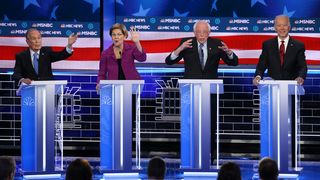On Saturday night as former vice-president Joe Biden walked into a university hall to greet fans after his overwhelming victory in the South Carolina primary, Curtis Mayfield's 1971 classic Move on Up filled the room.
"Take nothing less, than the second best," Mayfield sings in the last verse that played before Biden reached the lectern.
But can Joe Biden take more than second best in the Democratic presidential primaries?
We'll start to find out tomorrow as results roll in from Super Tuesday in the United States where 14 states and one territory go to the polls in what is arguably the most important day on the primary calendar.
To win the Democratic nomination, a candidate needs to win 1991 of the 3979 delegates on offer.
A tight result on Super Tuesday can set the stage for a protracted battle all the way up to the Democratic National Committee Convention in July.
With massive and influential states like California and Texas heading to the polls tonight, Super Tuesday will test candidates' viability across virtually every demographic segment imaginable. And the rewards are rich. Roughly one third of the total available delegates in the race are up for grabs.
As such, Super Tuesday has come to represent a bellwether in American presidential politics.
A candidate that makes a strong showing across the board can amass enough delegates to take a near-unassailable lead in the race for the Democratic nomination.
A tight result on Super Tuesday can set the stage for a protracted battle all the way up to the Democratic National Committee Convention in July.
So, where do the candidates stand?
The Biden win in South Carolina was a landslide. He claimed 48.4 per cent of the votes and, crucially, three quarters of the delegates. It's the first real, verifiable sign of life his campaign has shown so far in the race. In fact, it's the first state Biden has won in 32 years of running for president across three campaigns.
The South Carolina primary was a hard deadline for a lifelong presidential campaigner running on a platform of electability, and Biden met it.
Momentum is one of the most important ingredients in a Super Tuesday coup, but the Biden campaign is racing from behind.
Vermont senator Bernie Sanders has finished first or second in every test to date. With the spoils of success and a monumental grassroots campaign in tow, Sanders has had teams leaving boot marks in strategic states for months.
Vermont senator Bernie Sanders has finished first or second in every test to date. With the spoils of success and a monumental grassroots campaign in tow, Sanders has had teams leaving boot marks in strategic states for months.
Former New York Mayor Mike Bloomberg has air-dropped over half a billion dollars on a national advertising campaign, commandeering the airwaves and injecting his campaign into living rooms across the country.
With Bloomberg's poor showings on the debate stage, and an aversion to the retail politics involved in campaigning for the early states, the results from tomorrow will give political scientists research fodder for decades as they question what the limits of money in American politics are.
Right now, Bloomberg's efforts have gathered him a national polling average of 16 per cent - a far cry from the strength needed to sweep Super Tuesday.
If Bloomberg falters in his first electoral test of the race, he may have a question of his own to answer: will he keep his word and throw the weight of his money behind the Democratic candidate, come what may?
Sanders and Massachusetts senator Elizabeth Warren both savaged Bloomberg on stage at the New Hampshire and Nevada debates, attacking his character directly and flatlining his polling growth. In these same debates, Bloomberg explicitly said that Sanders cannot beat Trump.
Meanwhile, a cash-strapped Biden campaign poured everything into South Carolina and will have had only three days to convert that victory into a larger, national-scale victory. The advantage for Biden in this regard is that a lot of Americans are only just now starting to tune into the race.
Biden's national polling average has fallen in the wake of poor performances in the early voting states, but he still notches a respectable 20 per cent, placing him comfortably in second place.
The story that is easily milked out is that of two white-haired warriors representing the progressive and moderate wings of the party locked in a battle for the soul of the party.
Sanders, who has a national average of 29 per cent, holds a meagre seven-delegate lead over Biden after the first four states which comprise about 5 per cent of the total delegates.
The story that is easily milked out is that of two white-haired warriors representing the progressive and moderate wings of the party locked in a battle for the soul of the party.
But the 78-year-old Sanders and 77-year-old Biden are both contending with noise from other candidates.
Along with Bloomberg's dollars, Biden's moderate lane has been clogged by Minnesota senator Amy Klobuchar and former Mayor of South Bend, Indiana, Pete Buttigieg. Both showed flashes of promise in the early, predominantly rural and white states but neither was able to build the broad coalition including minority support that's essential for a Super Tuesday conquest.
Buttigieg read the writing on the wall and dropped out on Sunday. The impetus appears to have been to lower the risk of a moderate pile-up that leaves a clear path to the nomination for the progressive Bernie Sanders. But his campaign's ghost could contribute to this regardless as Mayor Pete's name will still appear on the ballots across Super Tuesday states, amassing votes among those less attuned to the nuances of the race.
The Klobuchar campaign, on the other hand, appears to have placed its candidate in palliative care. After an impressive performance in New Hampshire, Klobuchar garnered a paltry 3 per cent of the vote in South Carolina. She looks set to be seeing through Super Tuesday from home turf in the hope of winning one sentimental race in Minnesota before presumably bowing out and possibly making the case for a VP nod.
Sanders' progressive peer, Elizabeth Warren, is bunkering down to emerge as a compromise candidate in the case that Super Tuesday and the subsequent states are inconclusive. If Sanders, Biden or Bloomberg are unable to reach 1991 delegates before the DNC Convention in July, that convention will be contested. With supporters of those candidates unable to reconcile their differences, Warren's pitch would be as the pro-capitalism progressive policy wonk well suited to tackle Trump in November.
With these factors all in place, tomorrow we will get answers to three important questions: Was Biden's win in South Carolina enough to jolt his campaign back to life across the country? Is Mike Bloomberg's money the gold-plated silver bullet needed to win the nomination? Or is Bernie Sanders too strong to be stopped?
All three could be true at once. If that's the case, we're headed for a contested convention and an explosive and bitter intra-party battle that will play straight into the hands of President Donald Trump.






